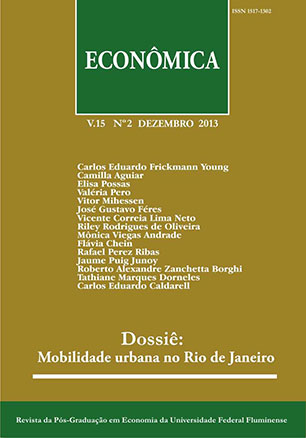Income Transfer Policies and Nutritional Condition of Children: An Evaluation of “Bolsa Família”
DOI:
https://doi.org/10.22409/reuff.v15i2.34866Resumo
This paper investigates the impact of the Bolsa Familia program, a conditional cash transfer program focused on Brazilian poor families, on children‘s nutritional status in a context of low monitoring of conditionalities. The analysis is carried out using data from a baseline survey conducted in 2005, the “Bolsa Família” Impact Evaluation Research. The evaluation is made using the Propensity Score Matchingtechnique. Besides considering observational differences between beneficiaries and non-beneficiaries of Bolsa Família Program, our empirical strategy also addresses some concerns about informational issues in order to take into account potential endogeneity of the decision to participate in the Program. Our final results show a positive effect of Bolsa Família Program on children nutritional status only when
controlling for the informational bias and for those children fulfilling educational requirements; however, this positive impact on nutritional status is restricted to BMIfor-age but does not affect height-for-age.
Downloads
Downloads
Publicado
Edição
Seção
Licença
Autores que publicam nesta revista concordam com os seguintes termos:
a.Autores mantém os direitos autorais e concedem à revista o direito de primeira publicação, com o trabalho simultaneamente licenciado sob a Licença Creative Commons Attribution que permite o compartilhamento do trabalho com reconhecimento da autoria e publicação inicial nesta revista.
b.Autores têm autorização para assumir contratos adicionais separadamente, para distribuição não-exclusiva da versão do trabalho publicada nesta revista (ex.: publicar em repositório institucional ou como capítulo de livro), com reconhecimento de autoria e publicação inicial nesta revista.
c.Autores têm permissão e são estimulados a publicar e distribuir seu trabalho online (ex.: em repositórios institucionais ou na sua página pessoal) a qualquer ponto antes ou durante o processo editorial, já que isso pode gerar alterações produtivas, bem como aumentar o impacto e a citação do trabalho publicado (Veja O Efeito do Acesso Livre).

